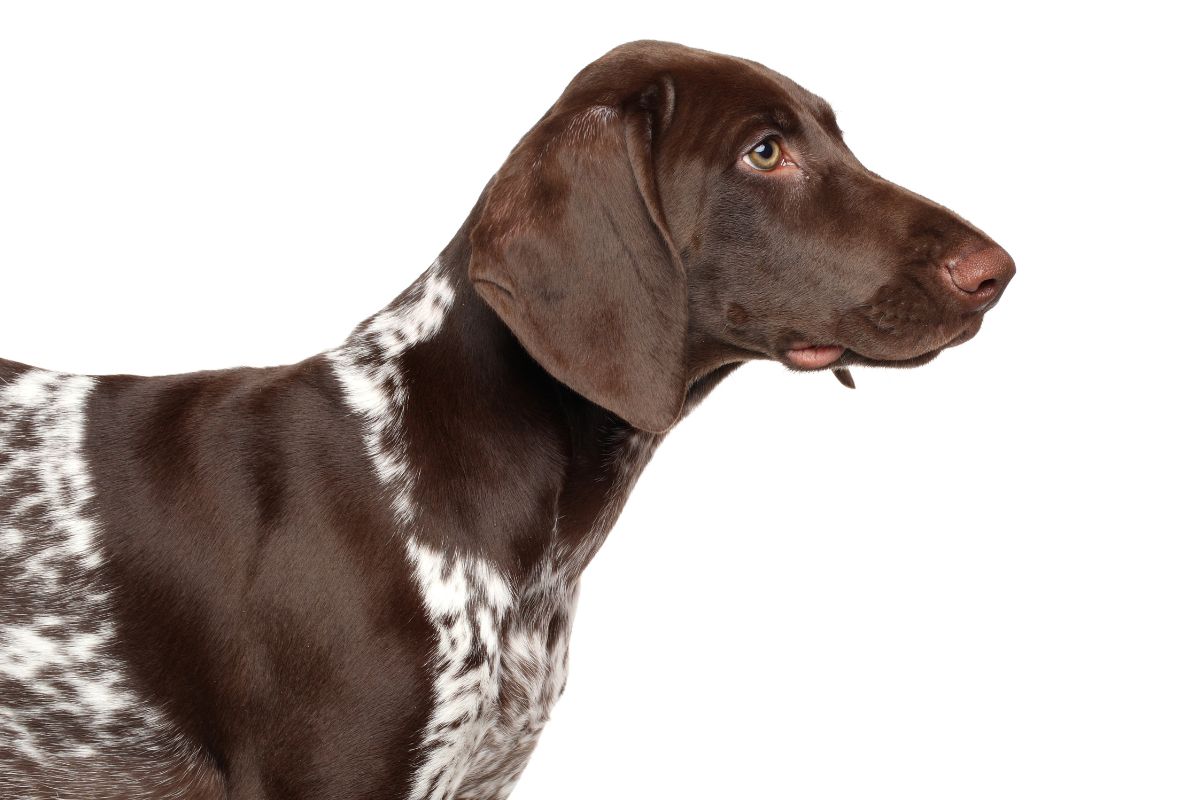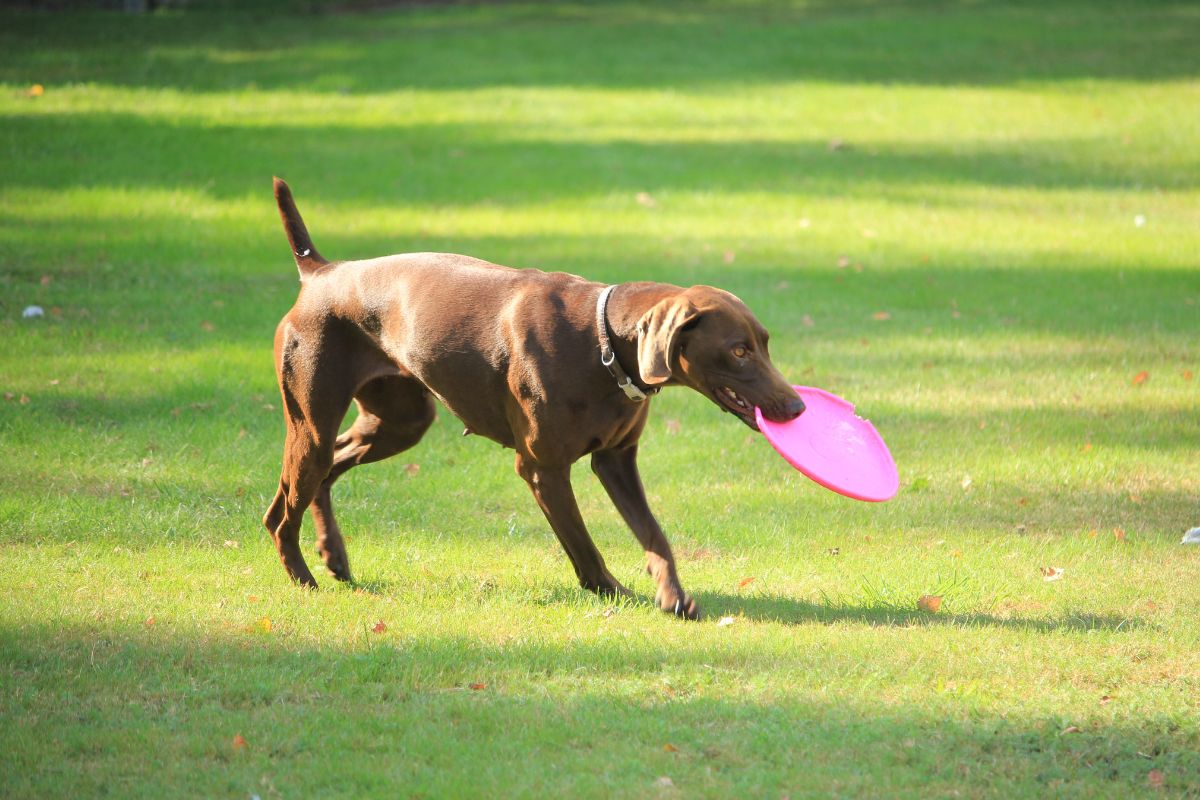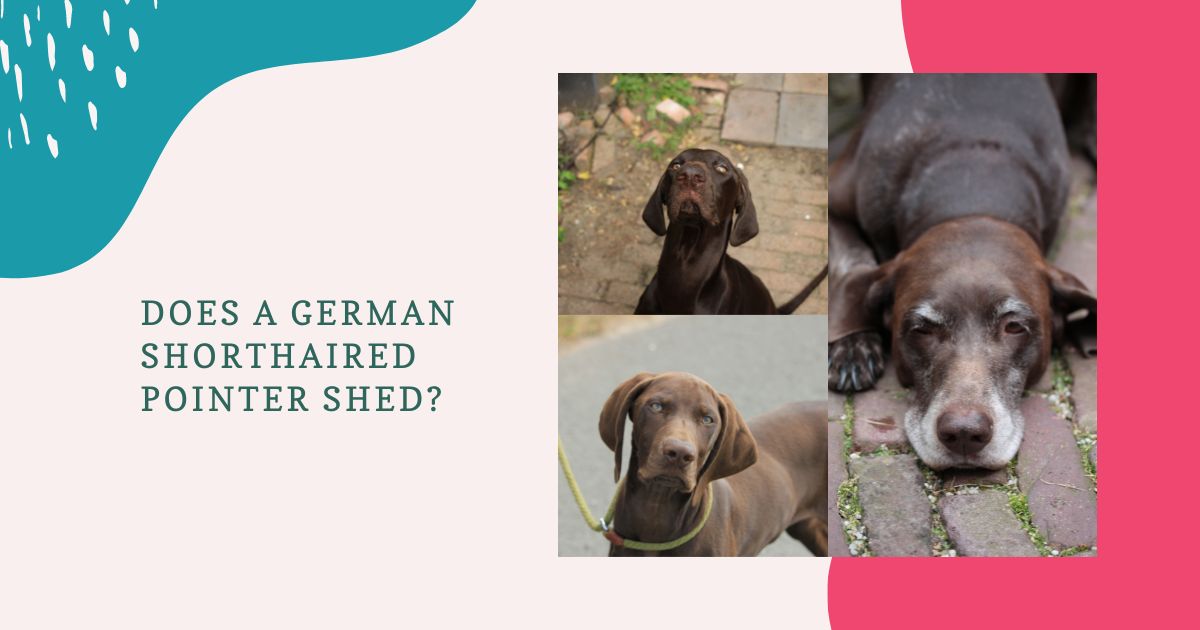What is a German Shorthaired Pointer?
The German Shorthaired Pointer (GSP) is a versatile and athletic dog breed that originated in Germany in the nineteenth century. But does a German Shorthaired Pointer shed?
German Shorthaired Pointers are highly clever and trainable and have hunting instincts, making them popular in other sports such as agility, obedience, and dock diving. They are loyal and have a friendly temperament but require much attention and exercise.

Does a German Shorthaired Pointer Shed?
While the German Shorthaired Pointer does shed, unlike other breeds, it does not shed excessively. Their short, dense coat requires little maintenance, and they only shed heavily twice a year owing to seasonal changes.
German Shorthaired Pointer’s fur must receive frequent brushing to prevent shedding and maintain a healthy, glossy coat. Brushing will help reloosened fur and prevent matting or tangling. Healthy and lustrous GSP dog fur requires regular brushing to assist in managing to shed and maintain their coat.
In addition to brushing, adequate nutrition and frequent activity are crucial for your German Shorthaired Pointer. Feeding them high-quality, protein- and vitamin-rich dog food will help maintain their coat and decrease shedding.
GSPs have amiable, affectionate demeanors, making them excellent family pets. However, many prospective owners may be concerned about the German Shorthaired Pointer dog shedding tendencies and what it takes to keep their coats in good condition.
If you have allergies, remember that even if German Shorthaired Pointers do not shed excessively, they produce dander, exacerbating allergy problems. Spend some time with a German Shorthaired Pointer before bringing one into your home if allergies are an issue.
The German Shorthaired Pointer Dog’s Lifespan
A German Shorthaired Pointer’s lifespan averages 10 to 14 years. This lifespan varies according to various factors such as food, exercise, genetics, and overall health. German Shorthaired Pointers, like other dog breeds, are prone to multiple health conditions, such as ear infections, hip dysplasia, and allergies, which can shorten their longevity.
A well-balanced diet, moderate exercise, and regular check-ups with a veterinarian are all vital to your German Shorthaired Pointer’s health and longevity. Furthermore, early detection and treatment of any health problems can assist in keeping them from worsening into more severe disorders.
While the lifespan of a German Shorthaired Pointer may seem relatively short, they are known for their energetic and active personalities, which can make them seem like puppies well into their senior years. They can live a happy and fulfilling life as beloved family pets with proper care and attention.
What Does a German Shorthaired Pointer Cost?
The cost of a GSP can vary widely depending on several factors. On average, expect to pay between $800 to $2,000 for a German Shorthaired Pointer from a reputable breeder. However, some breeders may charge significantly more for puppies from champion bloodlines or with unique coat colors.
It is important to research when looking for a German Shorthaired Pointer breeder to ensure you are getting a healthy puppy from a reputable source. Reputable breeders typically provide health certificates and information about the puppy’s parents and lineage.
Aside from the initial cost of the puppy, you should also factor in ongoing expenses such as food, veterinary care, and training. German Shorthaired Pointers are a high-energy breed that requires plenty of exercise and mental stimulation, which can add to the cost of ownership.
If you are interested in adopting a GSP, you might be able to find one at a lower cost through a nearby animal shelter or rescue group. Adoption fees typically range from $100 to $500 and may include the cost of neutering and vaccinations.
So, how much is a German Shorthaired Pointer? The cost is dependent on several factors. Investing in a healthy, well-bred puppy from a reputable breeder is essential to ensure a long and happy life with your furry companion.
The price of caring for a German Shorthaired Pointer can change depending on many variables, including the dog’s age, size, health, and amount of activity. Here are some of the everyday expenses you can expect to incur while owning a German Shorthaired Pointer:
- Food: German Shorthaired Pointers are a medium to large breed that require high-quality dog food to maintain their energy levels and overall health. Depending on the brand and quality of food you choose, you can expect to spend between $40 to $100 per month on dog food.
- Veterinary Care: Regular veterinary care keeps your German Shorthaired Pointer healthy and prevents potential health issues. Vet care includes routine check-ups, vaccinations, and preventative care such as flea and tick prevention. The cost of veterinary care can vary depending on your location and the type of care required.
- Grooming: German Shorthaired Pointers have a short, dense coat that requires minimal grooming. They shed seasonally, so regular brushing can help manage to shed. Grooming supplies and tools range from $50 to $100 annually. You can also send your GSP to a professional groomer, the cost which will depend on the location and services provided.
- Training and exercise: Exercising your German Shorthaired Pointer can include daily walks, runs, and playtime.
You may also enroll your GSP in training classes or activities such as obedience, agility, or hunting training. The cost of training and exercise can vary depending on the training.
Regular walking, running, and playtime can help them release excess energy and reduce tension, which will help them sweat less.
The estimated maintenance cost of a German Shorthaired Pointer can range from $1,000 to $2,000 annually, depending on the individual dog’s needs and expenses. Budgeting for these expenses before adopting or buying a GSP is vital to ensure you can provide them with the care and attention they need.
How Big Do German Shorthaired Pointers Get?
German Shorthaired Pointers stand 21 to 25 inches (53.3 to 63.5 centimeters) at the shoulder as they are medium to large dogs. However, size might vary according to the dog’s genetics, nutrition, and exercise.
Male GSPs are often taller and heavier than females. Male adults typically weigh 55 to 70 pounds (24.9 to 31.8 kilograms), while females weigh 45-60 pounds (20.4 to 27.2 kilograms).
The Different Coat Colors on a German Shorthaired Pointer
German Shorthaired Pointers’ most prevalent hue is liver roan, ranging from a rich, dark brown to a lighter, reddish brown. Although black and white are less common, they exist in the breed. GSP with liver roan colors is popularly known as red German Shorthaired Pointers.
Some GSPs have spotty or speckled coats in various patterns and hues. Roan, a pattern of colored and white hairs, and ticked, a pattern of small spots or dots on a colorful backdrop, are examples of these patterns.
While coat color is a personal preference, certain colors may be more prone to skin problems or sun sensitivity. White German Shorthaired Pointers may be more inclined to skin cancer and sunburn and require more precautions outside.
Overall, the German Shorthaired Pointer coat comes in various stunning colors and patterns, a vital aspect of their distinctive appearance.
Grooming a German Shorthaired Pointer
GSP fur requires minimal maintenance. However, regularly grooming your German Shorthaired Pointer is essential to keep its coat healthy, lustrous, and free of dirt and loose hair.
Hiring a groomer can be a terrific option if you don’t have the time, knowledge, or equipment to groom your dog yourself. Professional groomers have the training to manage a wide range of breeds and coat types and perform specialist treatments such as nail clipping, ear cleaning, and teeth brushing.
Groomers can also access professional-grade tools and supplies to assist your dog’s coat and skin health. However, grooming your dog may be a great way to bond with your pet while saving money on grooming costs.
Here are some grooming tips for your GSP.
Brush the Coat
The best brush for German Shorthaired Pointer is a rubber curry comb, which is soft and will not scratch the skin. Using a grooming glove can help manage excessive shedding during the GSP shedding season.
Cleaning the Ears
Keeping your German Shorthaired Pointer’s ears clean and dry prevents ear infections. You can gently wipe your dog’s ears with a damp towel or use an ear-cleaning solution recommended by your veterinarian. Regularly checking your dog’s ears for signs of infection, such as redness, swelling, or discharge, is essential to maintain their overall health.
Trim the Nails
Regular nail trimming is necessary to prevent overgrowth and discomfort in your GSP. If you are unsure about clipping your dog’s nails, a professional groomer or veterinarian can help. It is essential to use sharp nail clippers and avoid cutting them quickly, which can cause bleeding and pain.
Regular Baths
Bathing a German Shorthaired Pointer should be done only when necessary, as over-bathing can destroy their coat’s natural oils. It is ideal to bathe your dog after brushing, and when bathing your dog, use a gentle shampoo and rinse thoroughly to remove all soap.
Once you have finished bathing your GSP, let them shake off any excess water before gently wringing out any remaining water and drying its coat with a towel. It is essential to ensure their head and ears are also adequately dried.
If you prefer to use a blow dryer on your dog, set it to the warm setting and hold it at least a foot away from their body to avoid irritating or burning their skin. It is crucial to dry your dog thoroughly to prevent skin irritation or infections.
Clean the Teeth
Maintaining your German Shorthaired Pointer’s dental health is also essential. Brushing your dog’s teeth regularly with a soft-bristled brush and dog toothpaste can help prevent tartar buildup, bad breath, and dental problems. Providing your dog with chew toys and dental treats can also help maintain their dental health.
In addition to regular grooming, taking your GSP for regular visits to the veterinarian is essential. These visits can help identify potential health issues and ensure your dog is current on vaccinations and preventative medications.
While grooming this dog breed requires little effort, it is crucial to caring for your dog. Regular grooming can help keep your German Shorthaired Pointer healthy, comfortable, and happy. Proper grooming allows your GSP to enjoy a long, healthy, and active life with their loving family.

Are German Shorthaired Pointers Protective?
German Shorthaired Pointers have a rich history as hunting dogs, bred specifically for pointing and retrieving games. Their innate hunting instincts and remarkable abilities have made them a favorite among hunters and sportspeople worldwide.
They are excellent pets for families and individuals because of their outgoing and amiable attitudes. However, some experts have reservations and do not recommend GSPs in households with children under seven.
Unlike other breeds, they are not known for being overly protective or territorial. German Shorthaired Pointers bark to alert their owners of potential threats or unusual activity; they are not typically aggressive toward strangers or other animals.
However, as with all dogs, their behavior can vary based on heredity, socialization, and training. Early socialization and training can help shape a GSP’s behavior and prevent undesirable aggression or territorial behavior.
They are highly perceptive and aware of their surroundings, quickly alerting their owners to potential dangers. Additionally, German Shorthaired Pointers are renowned for their loyalty and devotion to their owners, forming strong bonds with their families and being incredibly affectionate towards them.
When owning this dog breed, it is vital to remember their natural hunting instincts and high energy levels. They require plenty of physical exercises and mental stimulation to stay healthy and happy. Additionally, they are highly trainable, making them perfect for sports like agility and obedience training.
Other German Shorthaired Pointer Facts You Never Knew
GSPs Are Popular in Law Enforcement
German Shorthaired Pointers are known for their exceptional sense of smell, which makes them highly sought after in various fields that require scent detection. Law enforcement agencies often employ them as part of their K-9 units to help track and detect narcotics, explosives, and other illegal substances.
These dogs train extensively to identify and track specific scents, and their accuracy in scent detection makes them invaluable in many law enforcement operations.
German Shorthaired Pointers are also frequently used as search and rescue dogs, where their keen sense of smell allows them to locate missing persons in various environments.
In such cases, the dog’s training includes tracking human scents through forests, mountains, and urban areas. They can also locate people trapped under rubble or debris in disaster situations.
The versatility of these dogs makes them ideal for various scent-detection roles. They have widely used dog breeds for scent-detecting work since they are intelligent, obedient, and trainable. German Shorthaired Pointers have a high energy level, which allows them to work for extended periods without being tired.
GSPs Are Great Swimmers
German Shorthaired Pointers are natural athletes known for their hunting prowess and physical abilities. Their webbed feet and streamlined body enable them to excel in the water, making them great companions for swimming and water activities.
However, ensuring that you and your dog stay safe while enjoying these activities is essential.
Swimming is a great low-impact activity that can help you and your GSP. It is an excellent cardiovascular workout that can help keep your dog’s muscles toned and their weight under control. Additionally, swimming can be a fun way to bond with your dog by building trust and confidence.
Although they are great swimmers, they do not have a thick insulating coat like other water-loving breeds such as the Labrador Retriever. Swimming in chillier weather or water that hasn’t warmed up makes them more vulnerable to the cold.
Keeping a close eye on your dog while swimming and ensuring they do not stay in the water for too long is essential. Monitoring their body temperature and limiting their time in the water is crucial to keep them safe while swimming.
You can consider using a doggy life vest for extra buoyancy and warmth. Additionally, you can provide them with a cozy towel or blanket and dry them off after swimming.
The American Kennel Club Recognizes the GSP
The breed gained recognition from the American Kennel Club in 1930 and is now one of the most popular sporting breeds in the United States.
GSPs Excel in Many Sports
German Shorthaired Pointers are highly versatile dogs that thrive in various sports and activities. Their athleticism, intelligence, and eagerness to learn make them an excellent choice for competing in dog sports.
They excel in agility competitions, where they can show off their speed and agility as they navigate through challenging obstacle courses. Their love for water also makes them perfect candidates for dock diving, where they can leap off a dock and into a body of water to retrieve toys or objects.
Flyball is another popular sport that GSPs can participate in. This sport involves a team of dogs racing over a series of hurdles to retrieve a ball and bring it back to their handlers. Rally obedience is also an excellent option for this breed as they can showcase their obedience and intelligence while following a course of various tasks.
In addition to organized sports, they enjoy participating in hiking, running, and swimming activities. They love spending time outdoors and getting plenty of stimulation to burn off their energy.
If you want a fun way to bond with your dog, you could even build a DIY obstacle course in your backyard. These activities can be a terrific way to provide your dog with mental and physical stimulation while spending quality time together.
With their energy and willingness to learn, your furry friend will surely enjoy tackling something new and challenging with you.
GSPs Are Prone to Health Issues
German Shorthaired Pointers, like all breeds, can be prone to specific health issues that owners should be aware of. Hip dysplasia, a disease in which the hip joint does not develop properly, is one of the most prevalent health issues affecting German Shorthaired Pointers.
This condition can lead to arthritis and joint pain, which can be debilitating for the dog. GSPs can also be prone to other joint issues, such as elbow dysplasia and osteochondritis dissecans (OCD), which affect the development of the elbow joint and can cause lameness.
Bloat, a potentially fatal illness caused by the stomach twisting and filling with gas, is another health issue that German Shorthaired Pointers are susceptible to. The symptoms include vomiting, lethargy, and difficulty breathing.
Bloat can be dangerous if untreated, so if you think your GSP is suffering from bloat should immediately seek veterinarian attention.
German Shorthaired Pointers can also be susceptible to various eye conditions, such as cataracts, progressive retinal atrophy (PRA), and entropion, which is a condition where the eyelid rolls inward and irritates the eye.
Fortunately, many of these health issues can be prevented or managed with proper care and attention. Regular exercise, a balanced diet, and routine veterinary check-ups can help keep your dog healthy and happy.
Before purchasing a GSP puppy, do your homework on the breeder to guarantee adequate screening for hereditary health risks.
You can help ensure that your German Shorthaired Pointer lives a long and healthy by being aware of these potential health issues and taking preventative steps.
GSPs Are Great Companions
This dog breed can form strong bonds with their families and are loyal to their owners. They are friendly and outgoing canines that are typically good with children and other animals when properly socialized.
Because of this, they are also highly adaptable dogs that can live in various environments, from rural to urban settings.
GSPs Can Be Loud
German Shorthaired Pointers are known for their loud, distinctive bark, a breed hallmark. They have a strong instinct to protect their home and family, and their bark is one of the ways they communicate this. They often bark loudly to alert their owners of unusual activity or strangers, making them excellent watchdogs.
While their barking can be useful, it can also be frustrating for owners, particularly if their dog is prone to excessive barking.
GSPs are bright dogs that can learn to distinguish between severe threats and benign circumstances with adequate training and socialization, minimizing their inclination to bark excessively.
These dogs are also vocal in other ways, such as whining and howling, as they are a highly social breed that thrives on attention and interaction with their owners. They may vocalize to express excitement or to communicate their needs, such as when they want to play or go for a walk.
Owners must provide their German Shorthaired Pointers with enough mental and physical stimulation to keep them from becoming bored or restless. Regular exercise, playtime, and training sessions can help keep your GSP content and make you less likely to bark or engage in other problematic behaviors.
Providing your dog with attention and socialization can also help reduce their need to vocalize excessively.
GSPs Have Boundless Energy
German Shorthaired Pointers are known for their playful nature and boundless energy. This lively energy often extends to their sleeping habits, as they move around a lot while sleeping.
They can toss, turn, twist, and even tie themselves into knots to get much-needed rest. It’s almost as if their energy levels are so high that they can’t contain themselves, even in their dreams.
This unique behavior is a common trait among this breed, and many owners find it amusing to watch their furry friends move around so much while they sleep.
It is, therefore, important to ensure a comfortable sleeping environment and a soft bed to avoid injuries or discomfort. Despite their quirky sleeping habits, GSPs make excellent companions and are known for their loyalty and affectionate nature towards their owners.
GSPs Are Young at Heart
While a six-month-old German Shorthaired Pointer might physically appear mature, it can take a few years for them to mature out of their puppy behaviors. These dogs are known for their high energy levels and playful personalities, which can make them seem like perpetual puppies.
As a result, they require consistent training and socialization to help them learn appropriate behavior and become well-behaved household members.
Even as they age, GSPs tend to remain active and energetic. They are a highly athletic breed that enjoys running, chasing, and engaging in other physical activities. They make excellent companions for people who like outdoor activities such as hiking, running, and hunting.
Their exercise needs may change as they age, but they will always require enough mental and physical activity to stay happy and healthy. GSPs, with adequate care and attention, may live long and active lives, making them great lifetime companions for their owners.
GSPs Have Strong Instincts
GSPs have razor-sharp instincts for anything that could be prey, such as squirrels, birds, or rabbits because they are primarily a hunting breed. This predation drive may force them to run off-leash or scale fences or walls in pursuit of their prey. Being aware of your surroundings and paying attention when having activities with your GSP off the leash is important.

We’ve Got You Covered
Overall, the German Shorthaired Pointer is a breed that is highly flexible and versatile, excelling in a wide range of activities and surroundings.
Even though GSPs have a dense coat, they shed and require upkeep. Before you own one of these dogs, research to ensure you can provide food, vet expenses, grooming, training, and other expenses.
Budgeting for these costs before adopting this breed is critical to ensure they receive the care and attention required. Although German Shorthaired Pointers are not known for their protective nature, their alertness and attentiveness make them excellent watchdogs.
GSP dogs make fantastic companions for active families and individuals with proper care and upkeep.

